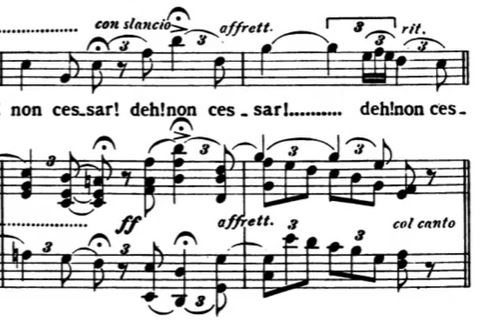DONNA NON VIDI MAI – an Aria from “Manon Lescaut”
The Portrait of Giacomo Puccini’s aria DONNA NON VIDI MAI
Read interesting facts and listen to great YouTube videos of Puccini’s famous aria “DONNA NON VIDI MAI”.
The aria DONNA NON VIDI MAI – Synopsis & Background
Synopsis: In front of an inn in Amiens. Students, citizens, young girls and soldiers stroll across the square. The students greet Des Grieux and tease him because he has no luck in love. A fanfare announces the arrival of a stagecoach. Manon and her brother Lescaut get out of it and stop for the night. Des Grieux catches sight of young Manon and immediately falls in love with her. When Lescaut goes to the inn to take care of the overnight stay, she is alone for a moment, and Des Grieux approaches her. He learns her name and that she will be leaving the next day to go to the convent on her father’s orders. Des Grieux offers her his help to escape her fate. Manon wants to know his name and promises to return in the evening. Soon they are interrupted, her brother has returned and leads her to her room. Des Grieux remains behind. He thinks rapturously of the beautiful young woman.
The aria that now follows is the most famous piece of this opera and the first famous aria that the then 33-year-old Puccini had written…. The ¾ meter gives the piece a lilting, dreamy character. The orchestral accompaniment of the melody is very rich, the tuning of the accompanying instruments with divided strings spans several octaves, emphasizing Lescaut’s passion with notes in extreme registers.
Des Grieux’s emotional aria returns the romantic motif of the violins that sounded when he addressed Manon:
In the second part, Des Grieux tenderly and rapturously quotes Manon’s motif “Manon Lescaut mi chiamo” over and over again, with which she had introduced herself:
It is a surprising effect that makes this aria seem almost like a duet.
The third part, “O susurro gentil, deh! Non cessar! “, repeated several times, ends with a passionate high B sung with verve:
The aria – the text of DONNA NON VIDI MAI
Donna non vidi mai simile
A questa!
A dirle: io t’amo,
A nuova vita
L’alma mia si desta.
“Manon Lescaut mi chiamo!”Come queste parole profumate
Nello spirto e ascose fibre
Vanno a carezzare.
O sussurro gentil, deh!
Non cessare!…
“Manon Lescaut mi chiamo!”
Sussurro gentil,
Deh! non cessare!
I never saw a woman like her!
To tell her: I love you,to life awakened my soulMy name is Manon Lescaut,these tender words no longer want meout of mind and penetrating flatteringlyin the most hidden folds of the heart.o gentle whisper, ah, not be still …
Great Interpretations of DONNA NON VIDI MAI
We hear 5 interpretations:
Björling was able to bring both Des Grieux’s passion and his vulnerability equally to the voice.
Donna non vidi mai – Björling
With a darkly colored voice interpreted by Jonas Kaufmann.
Donna non vidi mai – Kaufmann
This excerpt from Domingo’s interpretation, conducted by James Levine, is from the Met’s first live broadcast of an opera to Europe in 1980 and was a sensation. Domingo’s opulent, passionate voice was a major contributing factor.
Donna non vidi mai – Domingo
Accompanied by a modern recording of an orchestra, we hear Enrico Caruso’s interpretation. His voice is wonderfully soft and flowing. He sings this aria more broadly and dreamily, and it lasts a full 30 seconds longer than Domingo’s interpretation, for example.
Donna non vidi mai – Caruso
Pavarotti’s lyrical voice was closer to Rodolfo than to the more dramatic Des Grieux. Nevertheless, the Donna non vidi mai was one of Pavarotti’s parade arias, to which he could give his incomparable blend of warmth and brilliance of voice.
Donna non vidi mai – Pavarotti
Peter Lutz, opera-inside, the online opera guide to the aria “DONNA NON VIDI MAI” from the opera “Manon Lescaut” by Giacomo Puccini







Leave a Reply
Want to join the discussion?Feel free to contribute!